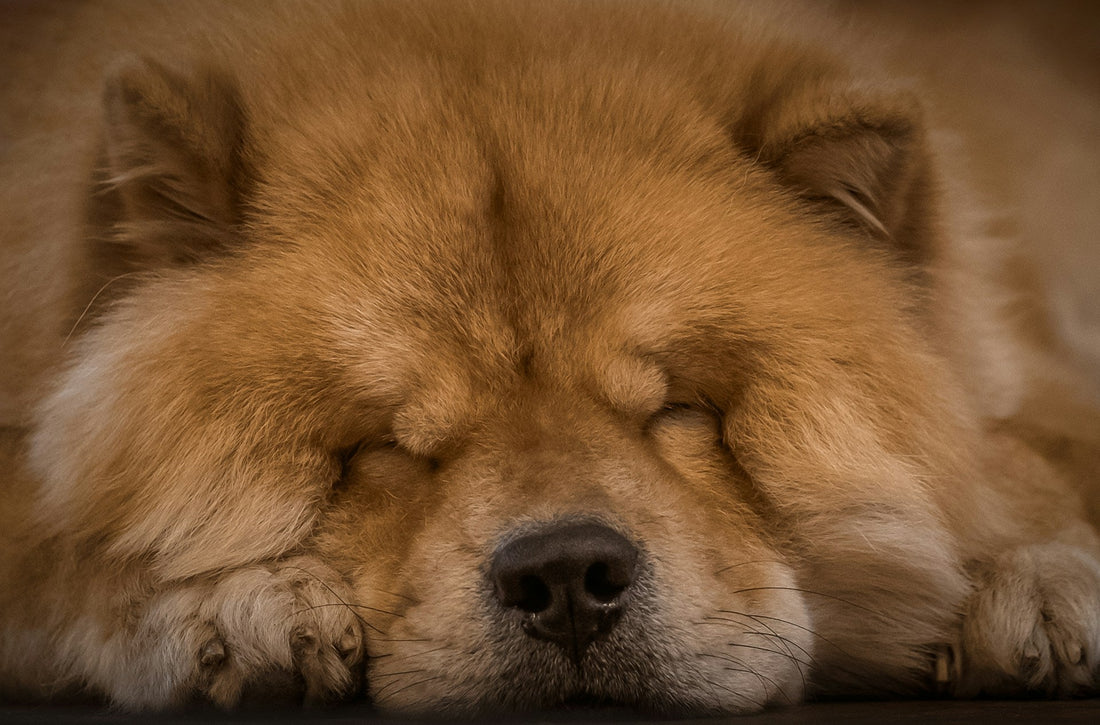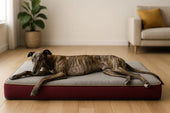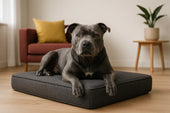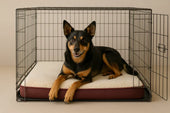Key Takeaways
- Dogs, like humans, benefit from a consistent day-night cycle that supports their circadian rhythms.
- Leaving lights on at night can cause disrupted sleep, anxiety, and even behavioral issues in some dogs.
- Puppies, senior dogs, and anxious dogs may require dim ambient light to feel secure.
- Scientific and veterinary perspectives largely agree that dogs sleep best in darkness or low-light conditions that mimic nature.
- Practical suggestions include using motion-sensor night lights, maintaining bedtime routines, and creating quiet, cozy sleeping spaces.
- Every dog is different—observing your pet’s behavior is key to making the best decision for their nighttime lighting.
PetCareShed’s Expert Picks for Happy, Healthy Dogs
Introduction
As pet parents, we often find ourselves worrying about the tiniest details when it comes to our furry companions. One such common concern is: "Should I turn off the light for my dog at night?" While it may seem like a small detail, light exposure plays a surprisingly important role in your dog’s wellbeing, sleep quality, and even behavior. Just as humans rely on natural light cycles for a healthy circadian rhythm, dogs too have biological clocks influenced by light and darkness.
But do dogs really need the light off to sleep well? Or could some dogs benefit from a bit of nighttime illumination?
In this in-depth article, we explore what science and veterinarians recommend, uncover the lesser-known truths about how light impacts canine sleep, and guide you through the pros and cons of nighttime lighting so you can make the best decision for your dog’s comfort and health.
Understanding a Dog’s Sleep Cycle: How Light Affects It
Dogs Have Circadian Rhythms Too
Like humans, dogs have an internal clock regulated by light, darkness, and daily activity. This 24-hour cycle—known as the circadian rhythm—affects everything from sleep patterns to hormone release and behavior.
“Dogs’ circadian rhythms are influenced by light just as ours are, although they’re more adaptable to minor changes,” says Dr. Joanne Gale, veterinary behaviorist at the Canine Wellness Institute.
Exposure to artificial light at night can confuse this rhythm, especially if the dog doesn’t have regular cues like bedtime routines or outdoor exposure during the day.
Natural vs. Artificial Light
In the wild, dogs evolved to sleep when it was dark and be active when it was light—an instinct that still lingers in domestic pets today. However, with modern homes filled with artificial light, our dogs are constantly exposed to light sources even after sundown, which may interfere with their ability to relax.
According to a 2020 study in Frontiers in Behavioral Neuroscience, chronic light exposure during nighttime hours leads to increased stress and restlessness in dogs, particularly in indoor-only pets.
PetCareShed’s Expert Picks for Happy, Healthy Dogs
Should You Leave the Light On for Your Dog?
Let’s weigh the pros and cons based on evidence and practical experiences.
✅ Potential Benefits of Leaving a Light On
- Helps with night-time anxiety: Some dogs, especially those with separation anxiety or past trauma, may feel comforted by dim lighting.
- Assists visually impaired dogs: Elderly dogs or those with vision problems may need a night light to navigate the space safely.
- Useful for puppies: Like human infants, puppies may feel more secure if there's soft light in the room.
“For dogs with age-related vision loss or cognitive dysfunction, we often recommend soft, non-intrusive lighting,” suggests Dr. Andrew Baxter, DVM, from Melbourne’s Animal Neurology Centre.
❌ Downsides of Leaving Lights On
- Disrupted melatonin production: Just like in humans, artificial light can reduce the release of melatonin, the hormone responsible for promoting restful sleep.
- Restlessness and poor sleep: Dogs may wake more frequently if there is too much ambient light.
- Behavioral issues: Light exposure may lead to overstimulation, barking, or pacing during the night.
What Science and Vets Recommend
Most veterinarians agree that dogs sleep best in dark or low-light environments, especially if they are otherwise healthy and not prone to anxiety or disorientation.
What Does Research Say?
- A 2019 paper published in Veterinary Behavior indicated that dogs subjected to total darkness during sleep showed better sleep efficiency than those exposed to light.
- The Journal of Sleep Research highlights that prolonged exposure to artificial lighting can impair REM sleep phases in animals.
These findings align with recommendations from veterinary behaviorists, who often suggest turning off the lights unless your dog has a medical or emotional reason not to.
Situational Considerations: When Lights Might Be Needed
🐾 Puppies
- Young pups can be startled by total darkness.
- Consider using a motion-sensitive, dim night light near their crate to help them adjust gradually.
🐶 Senior Dogs
- Older dogs may develop Canine Cognitive Dysfunction (doggy dementia), making them disoriented in the dark.
- A subtle night light helps them feel safer and navigate better.
🏠 Dogs in New Homes
- A recent rescue or newly adopted dog might find comfort in soft lighting until they become familiar with their surroundings.
🧠 Anxious or Reactive Dogs
- For dogs with nighttime fears or heightened sensitivity, a constant light may worsen their condition. Instead, dim light and calming products (like pheromone diffusers) work better.
Practical Tips: How to Create the Best Sleep Environment
- Use motion-activated night lights near food bowls, doors, or sleeping areas.
- Establish a nighttime routine—walk, bathroom break, calming cues, then sleep.
- Invest in orthopedic or calming dog beds that offer better comfort and support.
- Keep noise minimal—TV, traffic, or other distractions can disturb sleep.
- Try white noise machines if your dog wakes up easily.
Related product recommendation: Calming Dog Beds Collection – PetCareShed
Historical Perspective: Dogs Then vs. Now
Historically, dogs slept outdoors or in barns, relying entirely on natural lighting. Over generations, domestic dogs have adapted somewhat, but not completely, to indoor life and artificial light environments.
"Dogs were never meant to sleep in brightly lit rooms—nature designed them for the rhythms of dawn and dusk," explains animal behavior historian Dr. Ruth Jansen.
Understanding this helps us replicate a more natural sleep cycle at home.
What Other Experts Say
- AKC (American Kennel Club) suggests turning off lights at night unless there’s a specific reason not to.
- RSPCA Australia emphasizes routines, quiet environments, and low light for dogs’ emotional and physical wellbeing.
- Purina mentions that sleep disruptions caused by noise and light can affect dog behavior during the day.
Read more at Purina’s dog sleep advice page
How to Know What’s Best for Your Dog
Not every dog is the same. Here are signs that can help you decide:
- Sleeps soundly in darkness: You can turn off the lights completely.
- Wakes frequently or seems anxious: Try a dim night light.
- Bumps into furniture at night: Consider vision issues—consult your vet.
- Cries or whines when alone: Could be a sign of separation anxiety; light may not be the answer—look into training or behavioral therapy.
Conclusion: Should You Turn Off the Light?
In most cases, yes—dogs sleep better in darkness. However, exceptions exist, especially for puppies, seniors, and anxious pets. The decision should be based on your dog’s behavior, health status, and individual needs.
When in doubt, try both scenarios and observe how your dog sleeps. Adjust as needed, and don’t hesitate to seek advice from a veterinarian if issues persist.
Frequently Asked Questions
Should dogs sleep in complete darkness?
Most dogs prefer darkness, but some may benefit from dim light if they’re anxious or have vision problems.
Is it bad to leave a light on for my dog?
Not necessarily, but bright lights can disrupt their sleep. A dim, warm-toned light is a better option if needed.
Do dogs have night vision?
Dogs have better night vision than humans, but not total night vision. Total darkness can still be disorienting for them.
Will a night light help my puppy sleep better?
Yes, especially in the early days. A soft light can ease anxiety and help them settle into a new routine.
Can light affect my dog's health?
Excessive light exposure can disturb sleep cycles, lower melatonin levels, and increase stress in dogs over time.
If you're looking to upgrade your dog’s sleeping space, check out our premium dog beds and calming sleep accessories at PetCareShed—because a good night's sleep starts with the right environment 🐾




















